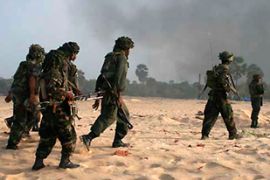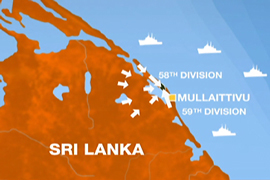Sri Lanka’s Tamil Tigers ‘defeated’
President claims victory over 26-year-old separitist movement as rebels call for international intervention.

Brigadier Udaya Nanayakkara, the defence ministry spokesman, told Al Jazeera: “After this linking up of two [army] divisions … we have completely denied the LTTE’s Sea Tigers access to the sea.
“The LTTE have no other choice but to surrender or commit suicide.
“They are slowly giving up. They are blowing up whatever arms and ammunition they have.”
Government forces have been hunting for Velupillai Prabhakaran, the LTTE chief, and his deputies for months, but it is unclear if they are still in the coastal strip or have already fled overseas.
Sporadic fighting
Defence officials told news agencies that sporadic fighting was continuing in a number of pockets across a small strip of land in the northeast of the island.
There was no immediate comment on the situation from the LTTE, commonly known as the Tamil Tigers. Reports are impossible to independently verify as the government has barred most journalists and aid workers from the conflict zone.
| Focus: Sri Lanka | ||||||

|
Jan Jananayagam from a group called Tamils Against Genocide, who has spoken to the LTTE, told Al Jazeera: “The Tamil Tigers have called for international intervention.
“They have said they are willing to co-operate with the UN and America. They do so because the people are suffering in the most enormous way,” she said.
Palitha Kohona, secretary of the Sri Lankan ministry of foreign affairs, told Al Jazeera that the Tamil Tigers had been “defeated comprehensively”, but admitted that achieving peace would take longer.
“You don’t have peace the day after winning the war,” he said.
“It takes time … patience … effort. The Sri Lankan government and people who have endured the nightmare of the LTTE’s terrorism have all of those in plenty. I am very confident we will win the peace.”
The Tamil Tigers have been fighting for an independent homeland for ethnic Tamils in the north and east of the Indian Ocean island for more than 25 years.
Civilian situation
About 200,000 civilians have escaped the war zone in recent months and are being held in overwhelmed displacement camps.
Kohona said the Sri Lankan government has rescued civilians who were being held hostage by the LTTE.
“We are looking after their health, food and shelter needs. That is the immediate challenge … until we can send them back to their own homes.
 |
“There is an immediate need to remove huge quantities of landmines … to restore homes, roads, railway lines, electricity, and water connections. The government is committed to doing this,” he said.
However, the International Committee of the Red Cross (ICRC) warned that there still remains the possibility of “an unimaginable humanitarian catastrophe” for the hundreds of wounded.
“No humanitarian organisation can help them in the current circumstances. People are left to their own devices,” Pierre Krahenbuhl, the ICRC’s director of operations, said.
Ban Ki-moon, the UN secretary-general, has sent his chief of staff, Vijay Nambiar, to Sri Lanka for a second time to try to bring the conflict to a peaceful conclusion.
Nambiar is expected to meet senior government officials after he arrives on Saturday, and push for ways “to secure the safety of the 50,000 to 100,000 civilians remaining inside the combat zone”, Gordon Weiss, a UN spokesman, said.
Up to 7,000 civilians were killed and 16,700 wounded in the fighting from January 20 until May 7, according to a UN document given to The Associated Press by a senior diplomat.
Since then, doctors in the war zone say more than 1,000 civilians have been killed in a week of heavy shelling that rights groups and foreign governments have blamed on Sri Lankan forces.
